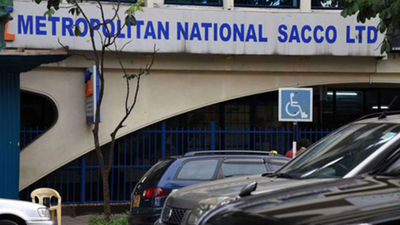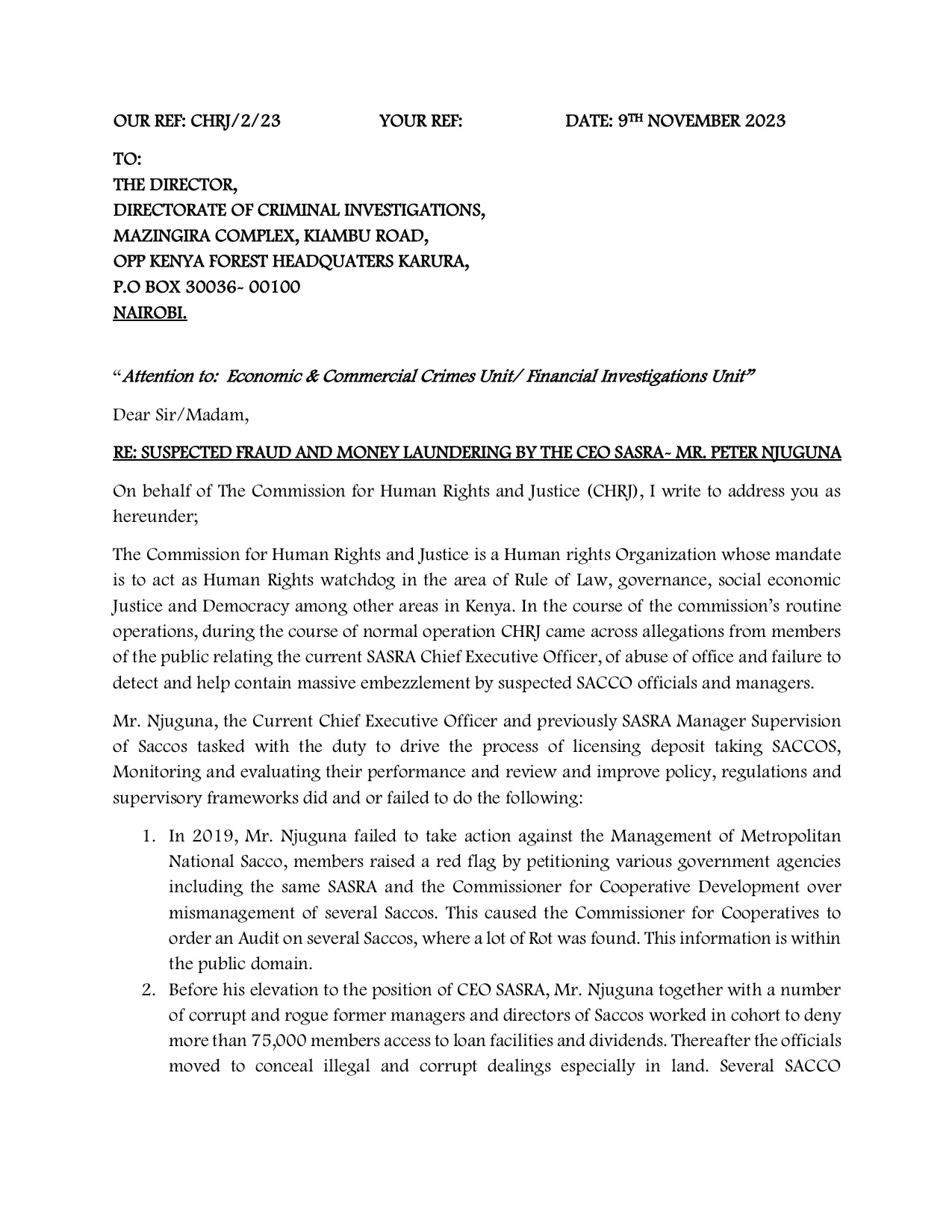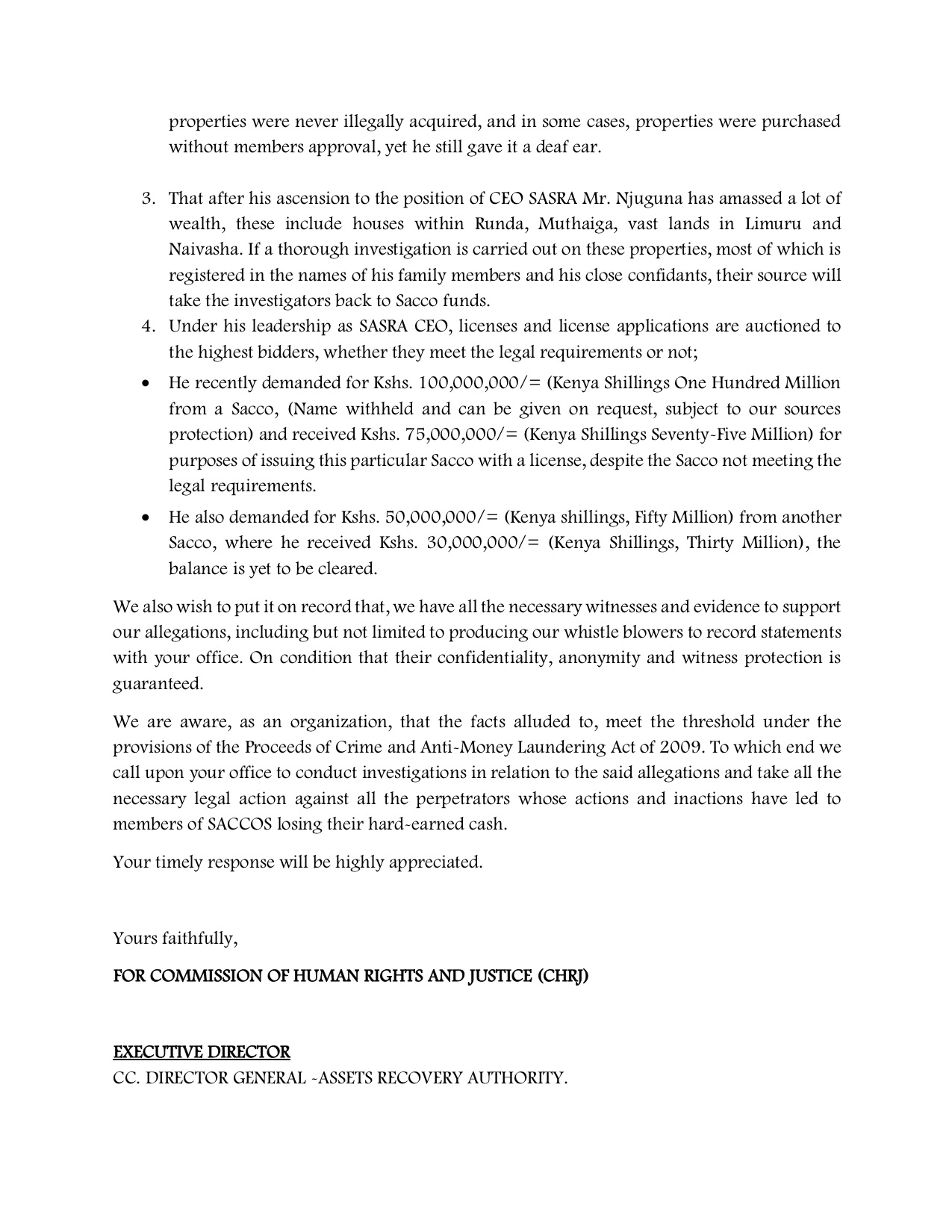Opinion
Why corruption is not the bad word it used to be

A few days ago, some members of the troubled Metropolitan National Sacco, formerly Kiambu Teachers Sacco, petitioned the government to investigate SASRA CEO Peter Njuguna for fraud. They want him fired or suspended so that the Director of Criminal Investigations can determine the extent of the corruption cartel within SASRA, the Sacco Societies Regulatory Authority.
This follows a couple of incidents that are just the tip of the iceberg of the rot within the cooperative sector. Among the issues is the fact that Peter Njuguna, as CEO and also in his former capacity as SASRA Manager Supervision of Saccos, has failed in his duty. The case alleges that his job has been to run a cartel of corrupt Sacco officials with whom he has embezzled millions of shillings of member funds and is extorting Saccos applying for a new license, looking to renew their licenses, or even those looking to be listed within the top rankings of SACCO listings!
An audit of the state of Saccos shows that the victims are many, and more will soon emerge because the rot is deep and systemic. In fact, the audit report was so bad that Sacco members in Kenya need to brace themselves for a crisis that will leave them with bad loans and prevent them from withdrawing their deposits!
However, this is not news. It cannot even be reported because it is not yet interesting enough for two main reasons. One is that, compared to other scandals, the theft of a couple of millions from different Saccos is not big enough to warrant headline news. That is why today, we have kind of forgotten a small article that appeared somewhere showing members of Metropolitan SACCO protesting the loss of 703 million shillings and other assets because, outside their friends and families, nobody seems to care.
We cannot blame Kenyans for not caring. We can’t even blame the media for not caring, investigating, or lighting the fire under Peter Njuguna’s feet for his alleged crimes. This is not a news item any more. For nearly a year now, on a nearly weekly basis, and for sure, month after month, we have been reading similar stories of schemes, fraud, and mismanagement. It is not a complete news story if there is no story of someone who somehow did something or refused to do something so that some money got lost from this public institution and that other agency.
We are desensitized. There is no shock factor, and frankly, who wants to read of these miseries when we have also been victims of the same crimes? Some will even go to ask why we need to glorify these criminal elements by giving them a face and name when we all know they end up nowhere.
After all, just looking at the theft, looting, and extortion that have taken place within the last ten years, we know how the story goes. We know that nothing comes out of exposing officials from state ministries, departments, agencies, and other public institutions that are looting taxpayer money. This has become so normal that it would make no news if we could go a week without a new scoop on a corrupt official. In fact, it would be breaking news if Kenya went a day without someone defrauding the public!
The difference, at least for the past year, is how these scandals are being conducted. Previously, we would get the main guy implicated in the scheme. Whether it was the NYS scandal, which had the honour of having two females as the main characters, or the classic Goldenberg, where the villain turned to God and repented, earning an early jail release, there was always a main character. The villain. The anti-hero was the criminal mastermind corrupting innocent bystanders’ who were outwitted to carry sacks or cash or move other documents to facilitate the crime. In other words, you could pull the thread from the institution’s banking system to the beneficiary.
Things have changed, particularly under the Ruto regime.
Nowadays, there don’t seem to be unwitting salon owners, guards, or secretaries duped into doing the dirty work on behalf of their trusted boss or former friend, now elevated into a political or government position. That is so elementary and, to be honest, carries a significant risk because the majority of the poor still suffer from nagging consciences that might lead them to speak or, worse yet, testify before some parliamentary committee. Not to mention the police have no problem squeezing the poor until they squeal like the rats they are.
It is not a risk worth taking. Not when you can do it in a sophisticated manner: a scheme among peers. In legal terms, it is called a conspiracy. In politically correct terms, it is called a collision in the red-carpeted halls of our public institutions; it is called a deal. Depending on the audience they want to appeal to, our local media frames it as either an inspiration or a scandal for the public’s entertainment. In documentaries, they call it a cartel. It’s fancy, but the truest definition is in a video where the drama is limited but speakers, witnesses, and victims have words aplenty.
Foreign powers, donors, and some old-school Kenyans call it corruption. It is a word we have heard for over thirty, forty, hey, maybe even fifty years, and anyone who has ever been linked with the word is now super rich and super okay. However, when the word is used in today’s vernacular and setting, it does not register as a bad word. It is a good word; it is not a bad word because it depends.
It used to be a bad word when one guy seemed to be getting away with billions of shillings or even millions—although considering the exchange rate, we can literally convert those into millions—of stollen money. It was corruption because some guy would corrupt some innocent secretary, and an accountant or semi-literate government clerk with tears streaming down their backs signed a document the big boss had called him to his office to sign. It was a knowledgeable guy, the person in a position of power and respect dirtying the system. Defiling it in order to enrich himself. Or herself.
Today, there are no sweaty clerks signing documents. These are not even in document form because they are deals. That is why they are legal conspiracies—something where many people, aware they are perverting justice and the system, choose to do it—one of the most impossible legal cases to make. These deals are made in big hotels, and they are so clever that they are part of the system. They are not something you can pin down, and they are often seen after the fact. Months, or even a year after the money has been stollen and utilized—converted into houses, cars, foreign trips, and school fees in private international universities—there is a third mistress, and that is just for the main guys.
In Peter Njuguna’s case, the reports show that there is no money to find because his money was handled in a literal conspiracy that started long before he was the CEO. It is alleged that he colluded with corrupt SACCO directors and officials to steal money from the Saccos. The money was stollen through a number of seemingly legal ways that could never be dictated until proper audits were done and also, possibly, until those directors left the institution.
Take the false construction of housing development projects, or even the allegation that the SACCO was rebranded without the approval of the members. A simple conspiracy between the SACCO leaderships—the officials and directors—who had power to transfer funds and approve projects simply found the main guy, their boss at SASRA, and made a deal to get rich. The reason they needed Njuguna was simple: they could not steal from the members without the approval of the directors and the officials.
They needed SASRA to approve their crimes because, otherwise, the regulatory authority would have flagged them for their theft and mismanagement of members’ funds. And SASRA needed to approve their crimes—that was the deal. For Peter Njuguna to look the other way and for the officials and directors to pay him off for not looking, reporting, or flagging their crimes. In other words, he got paid and was super rich for doing nothing.
And boy, was he paid. In fact, he was so paid that he got promoted from being the supervision manager to full CEO. Chief Executive Officer. Now, the guy who does nothing—the person who was getting paid to look away—had executive powers. It means he could expand his extortion deals from just looking away to looking! I hear they have expanded into extorting SACCOs for their license fees.
Right now, if you want to get a SACCO registered, you have SASRA under Peter Njuguna, who will not look away. They will look in and look deep. Actually, if you want a Sacco, right now, you don’t need to even qualify. Because they look away from useless things like regulations and performance, for about 100 million shillings, you can get an operator license from SASRA. Reports say that one, not so qualified Sacco was asked to pay 50 million shillings, but paid 30 million shillings. They did not get their license because that 50 million is non-negotiable. Afterall, everybody knows there will be no Sacco-ing taking place. Everyone is out to make a big pay day the moment they embezzle enough!
Nobody is spared from the extortion. Even the good ones have to pay. A small would-be Sacco that has done everything and all things and paid their dues and taken the managers for lunch and paid per diem is still expected to pay from three to five million shillings to get your operator license. Existing Saccos, the big guys on the block are also on the hook. If, for example, you want to be listed in the top rankings, you must pay SASRA for the honour or you will be thrown so far down your members will evaporate in a day!
Yeah. This thing is deep, it is impossibly clever and so intricate that resolving this would require possibly firing the whole team at SASRA and re-hiring on an elimination method because the corruption and extortion are so ingrained that it is a monster of an institution with no other role but to bleed Kenyans dry.
Unfortunately, nobody will do this. As it happens, Kenyans have been protesting and voicing their concerns against Peter Njuguna and the SASRA monster for some time now. Letter shave been written to the Commissioner of Cooperative Development and Peter Njuguna has been reported to the Director of Criminal Investigations for, well, criminals of theft and conspiracy and all that criminal stuff. Guess what? Nothing has happened. Nobody has been removed from their office, even on a temporary basis, and the government is silent on the matter.
If you wondering why even Principal Secretary or other officers from the national government who are responsible for the sector are silent, you must be new or new or new or never have been to Kenya and read about these things before. In fact, I bet you just scrolled down your screen or were deposited here from a search link of Patrick Kilemi, the Principal Secretary. Welcome.
Welcome to Kenya and the Kenya of 2023 where the word corruption is normal. Where stealing millions of shillings is not a shock and where nothing can be done to those who steal or mismanage or mishandle or whatever other fancy word, they use to not say the word steal because that way, we can also report that the money was ‘lost’ or worse, it is missing.
Never stollen. Because if we said it was stollen, then it would mean that the Director of Criminal Investigation who is aware of this case would have to take action. And how do you take action on such an intricate conspiracy? Collusion? How do you bring cohorts and cartels to justice? Going by past experience, we can only assume that the impossible task of unravelling a crime is beyond the capabilities of the DCI. After all, if they have not managed to prosecute anyone—or keep them in jail long enough to pay for their crimes—in the good old days of simple corruption, how can we expect them to do anything in these days of sophisticated deals and schemes and cartel bosses who conduct their business in broad day light and invite the DCI investigators into their Runda homes to give their statements of the alleged crimes?
Find copy of the petition by Kenya Human Rights below:
Kenya Insights allows guest blogging, if you want to be published on Kenya’s most authoritative and accurate blog, have an expose, news TIPS, story angles, human interest stories, drop us an email on [email protected] or via Telegram
-

 News1 week ago
News1 week agoTHE FIRM IN THE DOCK: How Kaplan and Stratton Became the Most Scrutinised Law Firm in Kenya
-

 Investigations2 weeks ago
Investigations2 weeks agoMulti-Million Dollar Fraud: Three Kenyans Face US Extradition in Massive Cybercrime Conspiracy
-

 Economy1 week ago
Economy1 week agoIran Demands Arrest, Prosecution Of Kenya’s Cup of Joe Director Director Over Sh2.6 Billion Tea Fraud
-

 Business2 weeks ago
Business2 weeks agoA Farm in Kenya’s Rift Valley Ignites a National Reckoning With Israeli Investment
-

 Africa2 weeks ago
Africa2 weeks agoFBI Investigates Congresswoman Ilhan Omar’s Husband’s Sh3.8 Billion Businesses in Kenya, Somalia and Dubai
-

 Grapevine6 days ago
Grapevine6 days agoA UN Director Based in Nairobi Was Deep in an Intimate Friendship With Epstein — He Even Sent Her a Sex Toy
-

 News2 weeks ago
News2 weeks agoTragedy As City Hall Hands Corrupt Ghanaian Firm Multimillion Garbage Collection Tender
-

 Arts & Culture2 weeks ago
Arts & Culture2 weeks agoWhen Lent and Ramadan Meet: Christians and Muslims Start Their Fasting Season Together



















